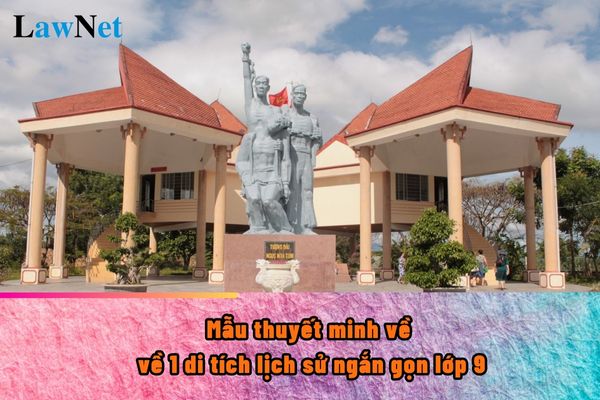Selection of samples of short description on a historical site for grade 9 students in Vietnam
Selection of samples of short description on a historical site for grade 9 students in Vietnam
Writing a descriptive essay about a historical site, which includes diagrams, tables, and illustrative images, is one of the requirements in the grade 9 Literature curriculum. Students can refer to the following samples:
|
Sample 1 Northern Region - Thang Long Imperial Citadel: Không chỉ là trung tâm chính trị, Hoàng thành Thăng Long còn là nơi diễn ra nhiều sự kiện lịch sử quan trọng. Du khách có thể tham quan các di tích như Cột cờ Hà Nội, Điện Kính Thiên, các khu khảo cổ... để tìm hiểu về kiến trúc, văn hóa và cuộc sống của người Việt xưa. Central Region - Hue Ancient Capital: Huế không chỉ nổi tiếng với Đại Nội và các lăng tẩm, mà còn có sông Hương thơ mộng, chợ Đông Ba sầm uất và những ngôi chùa cổ kính. Du khách có thể tham gia các tour du lịch trên sông Hương, thưởng thức các món ăn đặc sản của Huế và tìm hiểu về văn hóa cung đình. Southern Region - Cu Chi Tunnels: Địa đạo Củ Chi không chỉ là một hệ thống đường hầm ngầm khổng lồ mà còn là một bảo tàng sống động về cuộc kháng chiến chống Mỹ cứu nước của dân tộc Việt Nam. Du khách có thể tham quan các đoạn địa đạo, xem các hiện vật và nghe kể những câu chuyện lịch sử. |
*Note: The information about the sample introduction of a historical site is for reference only./.

Select Sample Introductions About a historical site for Grade 9? (Image from the Internet)
What are the language competency requirements for grade 9 Literature in Vietnam?
According to the regulations in Section IV of the General Education Program for Literature, issued together with Circular 32/2018/TT-BGDDT, the expected language competency for lower secondary school, specifically Grade 9, includes:
Understanding Vietnamese language knowledge and utilizing personal experiences and reasoning abilities to comprehend texts; reading texts according to type; understanding explicit and implicit content of texts.
Recognizing and initially being able to analyze and evaluate the content and predominant expressive features of the text; comparing this text with others; relating it to personal life experiences; thereby having personal perspectives and insights about life, enriching one's spiritual life.
In Grade 6 and Grade 7: writing narrative, descriptive, and expressive essays; beginning to write argumentative, explanatory, and practical essays. In Grade 8 and Grade 9: producing complete narrative, argumentative, and explanatory essays, following proper steps and combining various expressive methods.
Writing narrative texts focusing on creatively recounting stories read; witnessed or participated in events; imagined stories incorporating descriptive and expressive elements; descriptive texts focusing on describing daily activities; expressive texts about objects and people, expressing feelings towards literary works; composing poems mainly to recognize characteristics of familiar poetic forms; writing argumentative texts about issues requiring thoughts and opinions, employing relatively simple argumentative methods with easily found evidence; producing explanatory texts about subjects familiar to students with common structures; filling out forms, drafting practical texts like memos, emails, reports, advertisements, and interviews.
Writing process correctly, knowing how to find materials to meet writing requirements; understanding intellectual property rights and correctly citing texts.
Presenting ideas and emotions understandably; displaying confidence when speaking in front of many people; using appropriate language, gestures during speech; coherently recounting stories read or heard; sharing feelings, attitudes, experiences, ideas on discussed issues; discussing opinions on read or heard issues; explaining an object or process; speaking appropriately to the purpose, audience, and communication context; using images, symbols, diagrams,... to present issues effectively.
Listening with an appropriate attitude and summarizing content; recognizing and initially evaluating the arguments and evidence the speaker uses; identifying the speaker’s emotions; effectively responding to what was heard.
Are grade 9 students in Vietnam required to undertake summer training if their annual conduct results are insufficient?
Based on Article 13 of Circular 22/2021/TT-BGDDT, summer training regulations are as follows:
Summer Training
1. Students with annual conduct results rated as Not met must undertake summer training.
2. The form of summer training is determined by the Principal.
3. Based on the form of summer training, the class advisor assigns summer training tasks to students and informs the parents. At the end of the summer, if the assigned tasks are evaluated by the class advisor as completed (with a report on the process and results endorsed by the parents), the class advisor proposes to the Principal to reassess the annual conduct results of the student. The reassessment result replaces the annual conduct result for class promotion consideration under Article 12 of this Circular.
Students with annual conduct rated as Not met must undergo summer training.
Thus, Grade 9 students with insufficient annual conduct results are required to undertake additional summer training.

